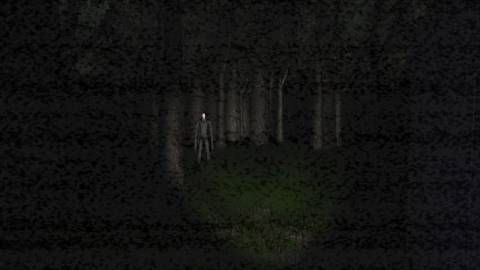
Even though Slender Man has no face, do not look at him. Even though Slender Man often appears far away, he’s always near. Even though Slender Man will not physically touch you, he’s dangerous. Even though Slender Man is more terrifying, ambitious and skilled at night, he’s still lurking during the day. Nowhere, it seems, is really safe.
You may not see him, but he’s there. And he’s scary as hell.
There are few examples of believable monster mythologies created in the modern age. The Internet has made it both incredibly easy and deceptively hard for the traditional myth to propagate, but Slender Man is a rare example of a tall tale slowly transformed into a legitimate myth, one that’s expanded well beyond its humble origins on the Something Awful forums. Slender Man is now a creepy creature with a life of its own, and it's only growing.
Cue the “Create Paranormal Images” thread from the Something Awful message boards in the Comedy Goldmine category from April 30, 2009. User “Gerogerigegege” created the thread.
“Creating paranormal images has been a hobby of mine for quite some time,” said Gerogerigegege in a thread that's now, amazingly, three years old. “Occasionally, I stumble upon odd web sites showcasing strange photos, and I always wondered if it were possible to get one of my own chops in a book, documentary, or web site just by casually leaking it out into the web -- whether they'd be supplements to bogus stories or not.”

The first few pages include your typical hair-raising submissions, including poorly Photoshopped ghosts and distorted faces with too much blur filtering. On the third page, however, user Victor Surge posts two altered photographs with accompanying stories. The faux accounts tell of “The Slender Man,” a person, creature or thing that apparently stalks children. It’s the fictional context, combined with the creepy photos, that cements “The Slender Man.”
“One of two recovered photographs from the Stirling City Library blaze,” reads the description attached to the second photograph. “Notable for being taken the day which fourteen children vanished and for what is referred to as ‘The Slender Man’. Deformities cited as film defects by officials. Fire at library occurred one week later. Actual photograph confiscated as evidence.”
Like The Blair Witch Project, a little sense of realism goes a long way. Your mind fills in the gaps, and your mind can be an evil thing.
“An urban legend requires an audience ignorant of the origin of the legend,” said Victor Surge in an interview with Know Your Meme. “It needs unverifiable third and forth hand (or more) accounts to perpetuate the myth. On the Internet, anyone is privy to its origins as evidenced by the very public Somethingawful thread. But what is funny is that despite this, it still spread. Internet memes are finicky things and by making something at the right place and time it can swell into an ‘Internet Urban Legend.’”
Responding to enthusiasm from other users, Victor Surge began expanding upon the legend, establishing Slender Man’s distinctive features, tropes that would later be exploited in other mediums, including video games.

“Both subjects were hunting in the Steinmen woods four hours before sundown,” reads a story about two hunters in the woods who encountered Slender Man. “Surviving subject states that while hunting both men grew uneasy as fog levels rapidly increased. A constant murmuring sound accompanied by a low hum eventually became apparent to the two men an hour after the fog increased.”
Slender Man captured the imagination of the thread, resulting in pages and pages of other users creating material related to Slender Man, diversifying its abilities and establishing a deep history of “sightings.” The thread keeps going, eventually sputtering out around page 46, but Slender Man didn’t die there.
Like Slender Man’s tentacles, the myth spread. Slender Man was just getting started.
The largest tangent, and one more likely responsible for introducing outsiders to the idea of Slender Man, was a YouTube series called Marble Hornets. The first episode of Marble Hornets was published in June 20, 2009, just weeks after Slender Man was conceived on the ground floor of Something Awful. The series follows Jay, a friend of Alex Kralie, a college film student who was preparing to shoot a movie called Marble Hornets, only to give up partway through, following a series of incidents wherein friends described him as distracted, irritated, and paranoid.
The first episode has 1,893,614 views, as of this writing. The series is still going, too, with episode 61 having been published just a week ago. Hundreds of thousands of users are still following the saga, myself included.
In Something Awful’s footsteps, Marble Hornets helps reinforce signs of Slender Man’s presence:
Giant Bomb readers will probably have the most familiarity with episode 10, though.
Like many others, I hadn’t heard about Slender Man until the video game from Parsec Productions, simply titled Slender, started making the rounds. Not thinking much of it, I booted up Slender in the middle of the day. A few minutes in, I shut it off. Slender was too much, even with the sun blaring. Why am I playing this?
In Slender, players are dropped into the middle of the woods, and given a deceptively simple task: collect eight scraps of paper. The pieces of paper are about Slender Man, though, and Slender Man is following you. True to lore, he does not speak and he does not attack, but he stalks. Oh, he stalks. And if you look at him, your vision goes screwy, and it sounds as though someone is blaring a broken, staticy radio through an amplifier meant to fill up a stadium. The sensation is unsettling, and looking at the screen is an exercise in terror.
(The sheer act of writing these sentences is giving me goosebumps, by the way.)
Parsec Productions, the studio behind Slender, is just one man, it turns out. Slender is the twisted creation of 35-year-old designer Mark Hadley of New Mexico. He’s a hard man to get a hold of, one who seems very private, and only responded to my requests regarding Slender with brief, pointed comments after weeks of prodding.

Hadley was unaware of Slender Man’s origins on Something Awful, and learned of it through Marble Hornet. Slender was merely an experiment for Hadley, who’d never used the popular development tool Unity before. Unity makes a simple game like this doable. Like Slender Man himself, the results were unintentional.
Hadley was reluctant to discuss previous creations, but we can gain some insight from archived pages. Until recently, the Parsec Productions website primarily pointed towards a board game he'd designed called Pancakes. Yes, Pancakes. It's no longer referenced on the site, but a little digging shows the Pancakes page is actually still active, even if the game is temporarily dead.
"That was a (somewhat failed) project of mine from a couple of years back," he said. "I'm also an aspiring card and board game designer, and I had made a simple card game that I was trying to sell, but haven't been successful at it. I took it down for now so that it doesn't cause confusion for people looking for info about Slender."
He would, however, speak to his inspirations.
“I like horror games, and one that especially sticks out is Amnesia: The Dark Descent,” he said. “I liked a lot about the game and I think it did a masterful job of creating a true horror experience through helplessness, atmosphere, and unsettling images (as well as building up suspense instead of relying solely on jump scares). If I had one complaint with it, it's that it doesn't have as much replay value since it's mostly scripted (I like it when games include at least some degree of randomization).”
Randomization is a huge element of Slender’s appeal. It’s resulted in a community of users scribbling out maps to help players who can’t or aren’t willing to put in the time to find all of Slender’s notes.
Slender works because it’s effective at establishing a chaotic atmosphere, and its design plays to Haldey’s own strengths and weaknesses as a creator. The character model for Slender Man is hysterically bad, but since the gameplay forces players to look away from Slender Man to survive, it’s irrelevant. It’s only when the player dies that Slender Man’s blocky polygons becomes front-and-center. By then, you’re so freaked out, it hardly matters.
Haldey said the basic character model for Slender Man was a “limitation of time,” though one he’s hoping to address with a graphical update in the future.
Work began on Slender in the beginning of May, and he released that first version soon after.
“The initial release was actually very limited,” he said. “I posted it to the Unity forums of course, since I had worked on it there. I also posted it to a Slender Man mythos forum, and to one other forum that I frequent. Other than that and the youtube video trailer (which I made to include with the aforementioned forum posts), I didn't really spread it around at all. Someone from one of the forums showed it to a popular YouTuber, who posted a video of himself playing it, and it went viral shortly after that.”
Here’s that original trailer, for reference:
That “popular YouTuber,” by the way, was Tom “JurassicJunkie” Wheldon, whose help in giving Slender an early, centralized place to live probably lead to much of its viral popularity. Upon learning there was no official website for Slender, Wheldon established www.slendergame.com a basic site (it’s more fleshed out now) with details about the Slender Man legend, and links to brand-new mirrors for the PC and Mac versions of the game.
More servers were essential, as all of them kept crashing. Wheldon's site is how I first found the game.
The website actually ticked Hadley off, since players kept assuming it was the official website.
“While initiative is good, I don't think it was right to do it without gaining my permission first,” he said.
Wheldon did ask for permission, but buried under a slew of emails, Hadley didn’t respond quickly. Given how long it took for me to get in touch with Hadley, I can understand why Wheldon went ahead, and solicited forgiveness later. When asked, Hadley still sounds slightly peeved about Wheldon’s site, but seems to have buried the hatchet now that it sports the tagline “this is not the official Slender game site.” The official site, complete with t-shirts, is now up.
Slender is currently at version 0.9.6, which includes some tiny changes to the game, including the addition of fog. As if Slender was a game that needed more ways to creep you out, right? Slender was not intended to be perpetually in development, but Hadley has plans to continue iterating on it, due to its enormous and continued popularity.

He’s not the only one hoping to capitalize on Slender Man in video game form, either. There’s a multiplayer variant in development called Slender: Source, and an awfully similar game set in different environments called Slenderman’s Shadow. More maps for the latter are on the way, and it gives credit where credit is due, as Slenderman’s Shadow opens with the text “based on Slender.”
The effectiveness of Slender Man as a tool of horror means he (or it) probably isn’t going away anytime soon. There’s even speculation Slender Man was an inspiration for a series of creatures on Doctor Who called The Silence. Who knows?
“We think the appeal about the Slenderman is that he isn't exactly what you'd picture a ‘monster’ to look like,” said Slender: Source designer Justin Hall. “He's sort of 'human' and that's probably what makes him so scary. [...] Why does he kidnap children, why doesn't he have a face, and why does he have tentacles? I think the fact that we perceive him as a human, but he's more than a human makes him scary. The fact that he cannot be explained.”
Hadley, the man responsible for scaring the crap out of so many of us, probably puts it best.
“We know nothing about his motives, his abilities, what he's capable of, or what his ultimate purpose is,” he said. “We only know he exists, and sometimes we're not even sure of that.”